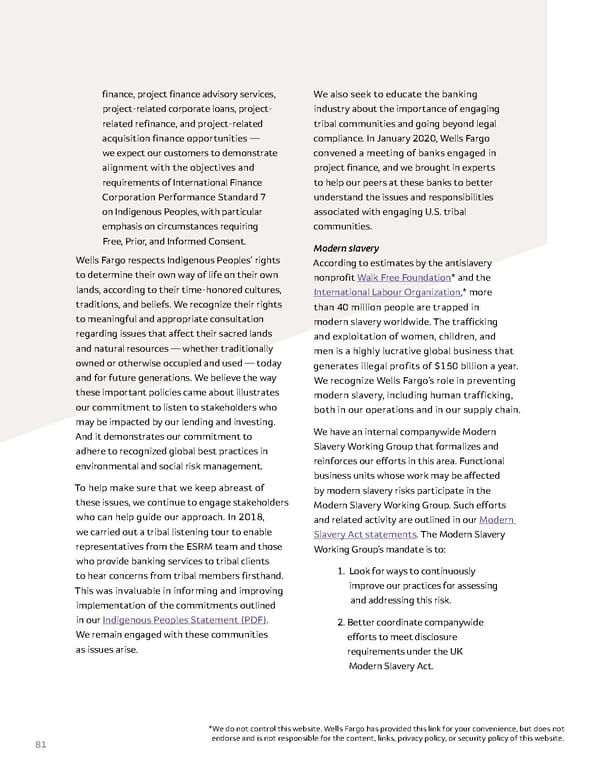81 finance, project finance advisory services, project-related corporate loans, project- related refinance, and project-related acquisition finance opportunities — we expect our customers to demonstrate alignment with the objectives and requirements of International Finance Corporation Performance Standard 7 on Indigenous Peoples, with particular emphasis on circumstances requiring Free, Prior, and Informed Consent . Wells Fargo respects Indigenous Peoples’ rights to determine their own way of life on their own lands, according to their time-honored cultures, traditions, and beliefs . We recognize their rights to meaningful and appropriate consultation regarding issues that affect their sacred lands and natural resources — whether traditionally owned or otherwise occupied and used — today and for future generations . We believe the way these important policies came about illustrates our commitment to listen to stakeholders who may be impacted by our lending and investing . And it demonstrates our commitment to adhere to recognized global best practices in environmental and social risk management . To help make sure that we keep abreast of these issues, we continue to engage stakeholders who can help guide our approach . In 2018, we carried out a tribal listening tour to enable representatives from the ESRM team and those who provide banking services to tribal clients to hear concerns from tribal members firsthand . This was invaluable in informing and improving implementation of the commitments outlined in our Indigenous Peoples Statement (PDF) . We remain engaged with these communities as issues arise . We also seek to educate the banking industry about the importance of engaging tribal communities and going beyond legal compliance . In January 2020, Wells Fargo convened a meeting of banks engaged in project finance, and we brought in experts to help our peers at these banks to better understand the issues and responsibilities associated with engaging U .S . tribal communities . Modern slavery According to estimates by the antislavery nonprofit Walk Free Foundation * and the International Labour Organization , * more than 40 million people are trapped in modern slavery worldwide . The trafficking and exploitation of women, children, and men is a highly lucrative global business that generates illegal profits of $150 billion a year . We recognize Wells Fargo’s role in preventing modern slavery, including human trafficking, both in our operations and in our supply chain . We have an internal companywide Modern Slavery Working Group that formalizes and reinforces our efforts in this area . Functional business units whose work may be affected by modern slavery risks participate in the Modern Slavery Working Group . Such efforts and related activity are outlined in our Modern Slavery Act statements . The Modern Slavery Working Group’s mandate is to: 1 . Look for ways to continuously improve our practices for assessing and addressing this risk . 2 . Better coordinate companywide efforts to meet disclosure requirements under the UK Modern Slavery Act . *We do not control this website . Wells Fargo has provided this link for your convenience, but does not endorse and is not responsible for the content, links, privacy policy, or security policy of this website .
 Wells Fargo ESG Report Page 80 Page 82
Wells Fargo ESG Report Page 80 Page 82